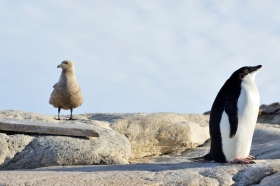Antarctic ecosystem due to change radically with climate change

According to researchers the Ross Sea will "be extensively modified by future climate change" in the coming decades creating longer periods of ice-free open water and affecting life cycles of all components of the ecosystem in a paper published and funded by the National Science Foundation (NSF). The researchers have drawn their information from the Regional Ocean Modeling System, a computer model that evaluates sea-ice, ocean, atmosphere and sea-shelf.
While conceding that "predicting future changes in ecosystems is challenging," the researchers note in a paper published in Geophysical Research Letters, the changes predicted by the computer model have the potential to create "significant but unpredictable impacts on the ocean's most pristine ecosystem."
The wind and temperature changes, the authors note, will affect the ecological balance at the base of the Antarctic food web--including changes in distributions of algae, shrimp-like krill and Antarctic silverfish--which, in turn, may be expected to cause disruptions in the upper portions of the food web, including penguins, seals and whales, which depend on those species for food.
A team of four researchers from the Virginia Institute of Marine Science (VIMS) at the College of William and Mary and the Center for Coastal Physical Oceanography at Old Dominion University in Norfolk, Va., jointly authored the paper.
Walker O. Smith, Jr., a professor at VIMS and the lead author of the study, said: "The model suggests that the substantial changes in the physical setting of the Ross Sea will induce severe changes in the present food web, changes that are driven by global climate change. Without a doubt the Ross Sea 100 years from now will be a completely different system than we know today."
The research was funded by the Polar Programs (awards: 0838948 and 0944254) and the Ocean Sciences divisions in NSF's Geosciences Directorate.
The U.S. Antarctic Program (USAP) coordinates all U.S. research on the Southernmost Continent and in the Southern Ocean as well as providing the necessary logistical support for that science. NSF manages the USAP.
The researchers note that over the last 50 years the distribution and extent of Antarctic sea ice, or ice that floats on the ocean surface, have drastically changed. Among these changes are a documented decrease of sea ice in the Bellingshausen-Amundsen sector, but an increase of sea ice in the Ross Sea sector of Antarctica.
Read more at The National Science Foundation.
Antarctic pinguin and South Polar Skua image via Shutterstock.
2014©. Copyright Environmental News Network